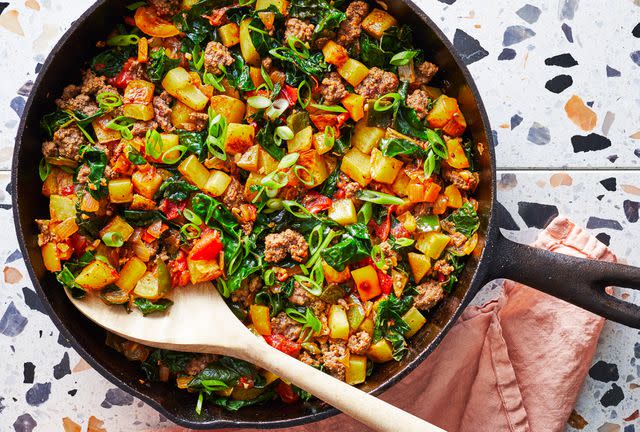What Is Zinc & Why Do You Need It? Here's What Dietitians Say
Here we’ll explain zinc’s crucial role in our health, food sources of zinc, common questions and more.
Reviewed by Dietitian Jessica Ball, M.S., RD
You may have found yourself in discussions about zinc, sparking curiosity about its significance in your diet. In this article, we’ll discuss the role of zinc, its potential benefits and food sources of the crucial mineral. Let’s dive into the science-backed importance of the micronutrient and answer commonly asked questions.

Photographer: Caitlin Bensel, Food Stylist: Ruth Blackburn
Pictured Recipe: Ground Beef & Potatoes Skillet
What Is Zinc?
Zinc is an essential trace mineral, which means you only need it in small amounts but it plays a significant role in various bodily functions. Rhyan Geiger, a registered dietitian and owner of Phoenix Vegan Dietitian adds, “Getting an adequate amount [of zinc] in your diet is important. Zinc helps synthesize DNA, heal wounds and support our immune systems. If dietary intake is low, a supplement may be an option.”
Why Do You Need Zinc?
Your body doesn’t naturally produce zinc, so you must obtain it through food. Getting adequate amounts of this mineral helps with several functions in the body. And luckily, you can typically get enough from diet alone if you’re eating balanced meals.
However, if you find you can’t reach the recommended amount through food, it may be a good idea to consult a dietitian or health care professional and discuss supplementation. There are many high-quality, third-party tested zinc supplements on the market—just look for a seal like NSF or Informed Sport on the label.
What Are the Health Benefits of Zinc?
Supports Immune System
Zinc is renowned for its immune-supporting properties. According to a 2017 review published in Nutrients, zinc may activate immune cells and function like a “danger signal.” Adequate zinc also supports the function of cells with immunity roles such as neutrophils and natural killer cells, which are often our bodies' first line of defense.
Supports Growth and Development
Especially important for children and adolescents, zinc is necessary for proper growth and development. Geiger explains, “One of the main functions of zinc is to help with DNA synthesis. Zinc helps cells grow and multiply, which is especially important in times of fast growth, like in pregnancy and childhood. Without proper zinc intake, cells may not be able to grow and multiply as effectively.”
Improves Wound Healing
According to Wound Repair and Regeneration, zinc-deficient individuals have been found to have poor wound healing. On the other hand, a 2018 review from Nutrients boasts how zinc plays a key role in all parts of wound healing, like membrane repair and scar formation.
Promotes Eye Health
A lesser-known benefit of zinc is supporting eye health. Specifically for those at risk of developing age-related macular degeneration, a study in Ophthalmology found supplementing with zinc may be helpful for prevention.
Food Sources of Zinc
The recommended dietary allowance for zinc varies by age, sex and life stage such as pregnancy. For the average adult, the RDA is between 8 and 11 milligrams per day. The Daily Value (a percentage of which, based on a 2,000-calorie daily diet, you'll see on food packaging) is 11 mg.
Here are some good food sources of zinc to help you meet your needs, per the USDA. We especially love how there are both animal and plant sources with zinc readily available:
Cooked Ground Beef: 3 ounces provides 5.3 mg of zinc (48% DV)
Lentils (cooked): 1 cup provides 2.5 mg of zinc (23% DV)
Chickpeas (cooked): 1 cup provides 2.5 mg of zinc (23% DV)
Nonfat Plain Yogurt: 1 cup provides 2.4 mg of zinc (22% DV)
Cooked Chicken Breast: 1 cup provides 1.4 mg of zinc (18% DV)
Cashews: 1 ounce provides 1.6 mg of zinc (15% DV)
Frequently Asked Questions
What happens if you take zinc every day?
Taking zinc in supplement form or enjoying zinc-rich foods daily in the recommended amounts supports overall health. However, it is important to be mindful of the upper limit, set at 40 mg zinc daily. Consuming excessive amounts of zinc long-term may lead to adverse effects such as copper deficiency and neurologic diseases.
Does zinc help with weight loss?
One 2019 study from Diabetology & Metabolic Syndrome demonstrated a group of 40 subjects with obesity who took zinc supplements experienced reductions in body weight, BMI, waist circumference and hip circumference compared to the control group. It’s suggested this may be due to zinc’s role in metabolism. However, the overall research suggests there’s currently limited evidence to suggest zinc directly supports weight loss.
Instead, your best bet is to continue to enjoy a balanced diet, prioritize adequate sleep and find movement that you enjoy. If you need more support setting realistic weight-loss goals, many dietitians offer in-person or virtual counseling.
Does zinc help with sleep?
Geiger points out studies published in Molecular Nutrition & Food Research, Workplace Health & Safety and the International Journal of Molecular Sciences that speak to how zinc may help improve sleep quality at night. She explains, “Because zinc has an impact on neurotransmitters, it may help promote sleepiness. More research is needed on how exactly it affects sleep, but the current research suggests the level of zinc in the blood is correlated with sleep quality.”
Can I take zinc and vitamin D together?
Yes, you can take zinc and vitamin D together. Having adequate amounts of both in the body helps maintain healthy bones and muscles.
The Bottom Line
Incorporating zinc-rich foods into your diet is crucial for overall health and well-being. From supporting your immune system to aiding in wound healing and sleep, zinc plays multifaceted roles in the body. Recipes like our Spicy Red Curry Beef & Rice or One-Pot Lentil & Vegetable Soup can help you enjoy this mineral throughout the day.
Up Next: What Is Magnesium & Why Do You Need It?
Read the original article on Eating Well.

